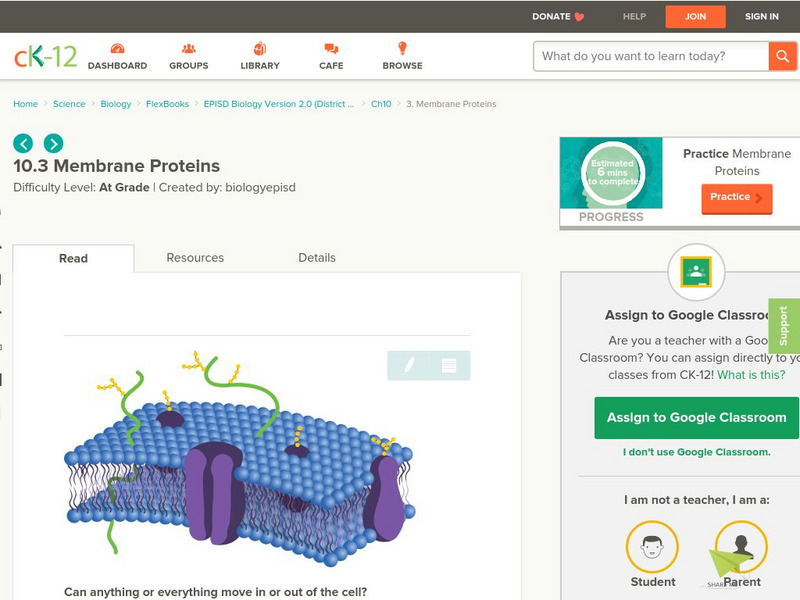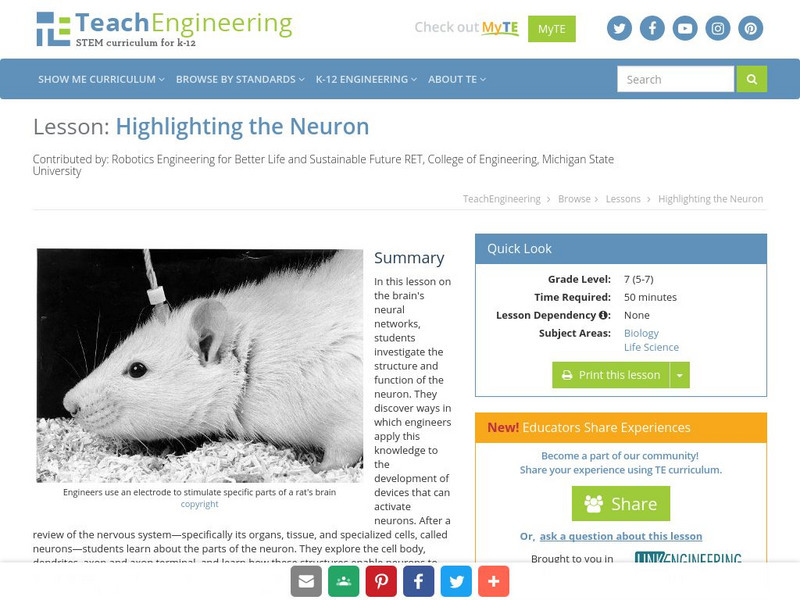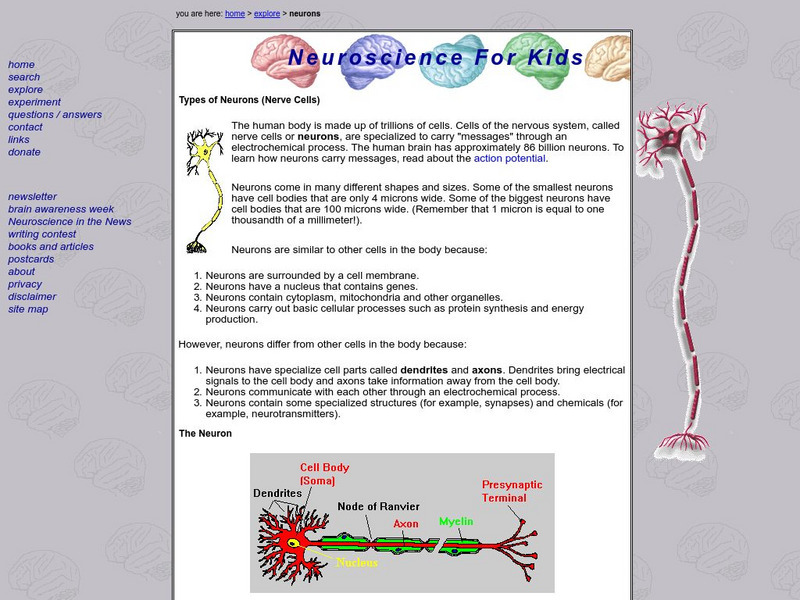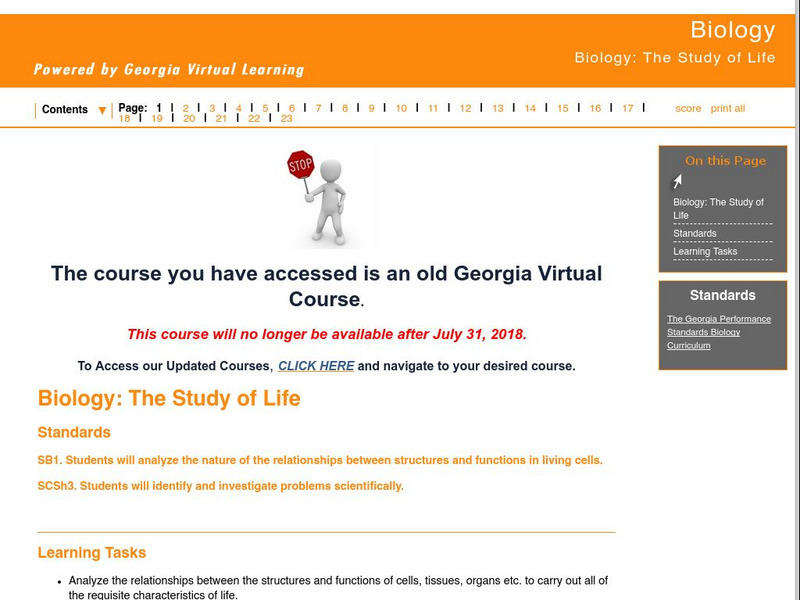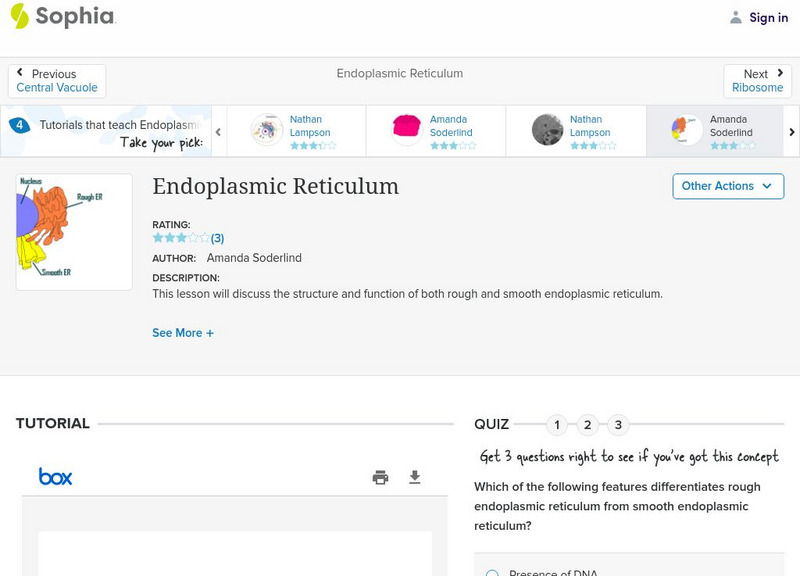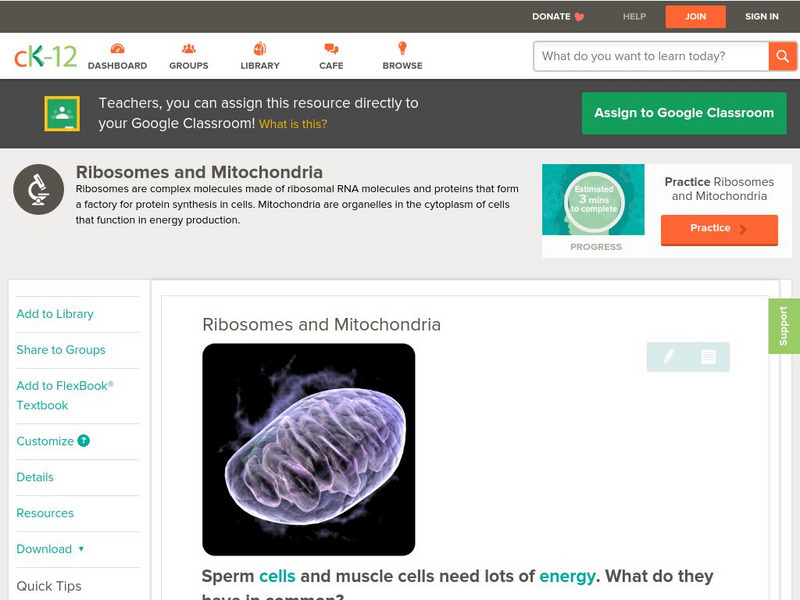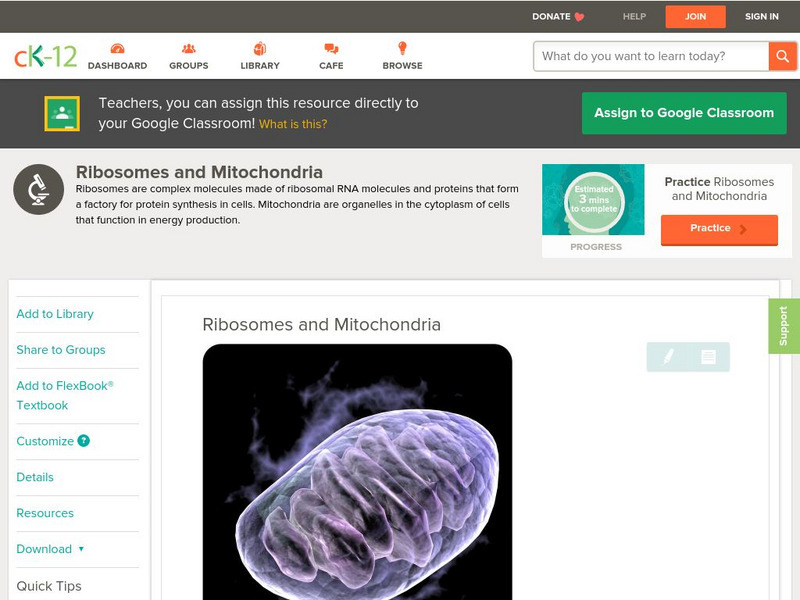National Cancer Institute at the National Institutes of Health
Seer Training Modules: Introduction to the Lymphatic System
Self-guided learning activity where students learn about the structure and function of the human lymphatic system. There is a short quiz at the end of the lesson to check for understanding.
CK-12 Foundation
Ck 12: Membrane Proteins
[Free Registration/Login may be required to access all resource tools.] Activity explores proteins in the plasma membrane describing their structure and function. The Fluid Mosaic Model is also summarized.
Georgia Department of Education
Ga Virtual Learning: Ap Biology: Animals
This unit focuses on the unique structure and function of both invertebrate and vertebrate animals. Students review their understanding of animal diversity, and take a closer look at the various organ systems found in the animal kingdom.
TeachEngineering
Teach Engineering: Highlighting the Neuron
For this lesson on the brain's neural networks, students investigate the structure and function of the neuron. They discover ways in which engineers apply this knowledge to the development of devices that can activate neurons. Includes...
National Cancer Institute at the National Institutes of Health
Seer Training Modules: Introduction to the Nervous System
Self-guided learning activity where students learn about the structure and function of the human nervous system. There is a short quiz at the end of the lesson to check for understanding.
National Cancer Institute at the National Institutes of Health
Seer Training Modules: Introduction to the Reproductive System
Self-guided learning activity where students learn about the structure and function of the male and female reproductive systems. There is a short quiz at the end of the lesson to check for understanding.
CK-12 Foundation
Ck 12: Life Science: 11.41 Nerve Impulse
Understand the structure and function of a nerve cell, and how messages are transmitted throughout the human body.
CK-12 Foundation
Ck 12: Biology: Prokaryotes Study Guide
Review the structure, function, and diversity of prokaryotic cells.
University of Washington
University of Washington: Types of Neurons
A good straightforward presentation of the different forms of neurons based on function. Includes easy to read graphics on the subject.
Georgia Department of Education
Ga Virtual Learning: Biology: The Study of Life
A learning module where students analyze the relationships between the structures and functions of cells, tissues, organs to carry out all of the requisite characteristics of life. They also describe the scope of biological study and...
PBS
Pbs Teachers: Scientific American: Never Say Die: How to Make a Nose
Investigate breakthroughs in stem cell research, and explore the structure and function of a DNA molecule. Create a model of a DNA from tagboard.
BiologyWise
Biology Wise: What Is the Nucleolus?
The characteristics, structure, and functions of the nucleolus are described.
Sophia Learning
Sophia: Endoplasmic Reticulum: Lesson 4
This lesson will discuss the structure and function of both rough and smooth endoplasmic reticulum. It is 4 of 6 in the series titled "Endoplasmic Reticulum."
Other
Net Wellness: Skin Care
Contains information about the following: how the skin functions, skin structure, the epidermis, the stratum corneum, the middle epidermis, the basal layer, epidermal cell summary, the dermis, aging and its effects on the skin, natural...
Curated OER
The World of Cells: Golgi Apparatus
A very brief explanation of the structure and function of this organelle.
TED Talks
Ted: Ted Ed: What Are Those Floaty Things in Your Eye?
Sometimes, against a uniform, bright background such as a clear sky or a blank computer screen, you might see things floating across your field of vision. What are these moving objects, and how are you seeing them? This video explains...
Curated OER
The Virtual Cell: Cell Biology
In this interactive site, you are presented with a picture of a cell and a description of the structure and function of the parts of the cell. Pictures are colorful and the explanations are short but informative.
Hanover College
Hanover College: The Physical Factors Behind the Action
A frames page that gives the background to understand the way cells communicate (nerve cells). Each topic in the left frame triggers a tutorial on the right. Most have graphics or animated gifs to teach the material. Good background to...
CK-12 Foundation
Ck 12: Life Science: Organelles
[Free Registration/Login may be required to access all resource tools.] All organelles are found in eukaryotic cells, while most are not found in prokaryotic cells. Learn more about organelles in this learning module produced by CK-12.
University of Wisconsin
The Why Files: Of Cancer 'N Car Keys
"The real, life-threatening problem with most cancers is that they migrate away from the initial site." This article delves into the question of "How do cancer cells move about?"
Texas Instruments
Texas Instruments: The Bigger the Better?
In this activity, students calculate the surface area and volume of different shaped cell models. They develop an understanding of the differences in cells and their function
CK-12 Foundation
Ck 12: Biology: Ribosomes and Mitochondria
[Free Registration/Login may be required to access all resource tools.] Describes the structure and function of ribosomes and mitochondria.
CK-12 Foundation
Ck 12: Biology: Ribosomes and Mitochondria
[Free Registration/Login may be required to access all resource tools.] Describes the structure and function of ribosomes and mitochondria.
CK-12 Foundation
Ck 12: Biology: Ribosomes and Mitochondria
[Free Registration/Login may be required to access all resource tools.] Describes the structure and function of ribosomes and mitochondria.
Other popular searches
- Cell Parts and Functions
- Cell Structures Functions
- Cell Structure & Function
- Cell Structure + Function
- Cell Structure Function
- Cell Structures and Functions
- Plant Cell Parts Functions
- Cell Structure and Functions



